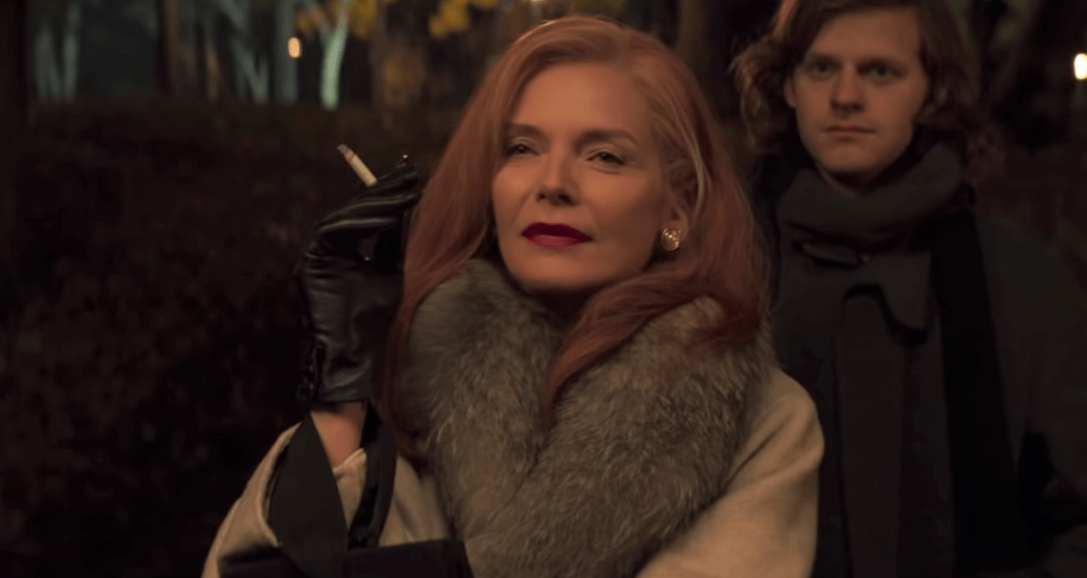Nobody does luxury quite like Michelle Pfeiffer. And in Azazel Jacobs’ adaptation of Patrick deWitt’s novel French Exit, Pfeiffer fully embodies the soul of a rich Manhattan socialite in the twilight of her life. While there’s really very little to love about Pfeiffer’s acerbic Francis Price, the audience, like everyone in her life, is drawn to her and charmed by her.
French Exit follows the story of Francis Price, who decides to move to Paris now that she’s realized the money is about to run out. Coming from a life of immense privilege and New York society, her husband’s death and debts have piled up and she’s trying to make a graceful exit. In many ways, French Exit is an entire movie about literal french exits. The turn of phrase, often likened to the Irish goodbye, is defined as a hasty exit made without saying farewells to anybody.
But, the problem comes with the fact that while Frances might be lured in by the idea of a true french exit, she actually does want to receive the closure that she needs before her final goodbyes. This is why she drags her adult son Malcolm (Lucas Hedges) along with her across the ocean. This is why she befriends the eccentric Madame Reynard (Valerie Mahaffey), despite her initial aversions. This is why she seeks out the psychic Madeleine (Danielle Macdonald) so that she can perform a seance to speak with her dead husband. While french exits might seem like a romantic idea, we all want closure in the end.
Much of the strength of French Exit relies on Pfeiffer’s fantastic performance. The story is oddly paced, stagnant at times with heavy dialogue and scenes that could have been cut. Pfeiffer’s Frances is what lights up the room. Her viciousness, her coldness, her mysteriousness, her charisma. It draws everyone close to her, they all want to get to know her, they want to flatter her, they want to question her. There is an air of grace to Frances, who carries herself without giving anyone else the time of day.
Her confidence and daring are what everyone sees. At one point, Madame Reynard recounts seeing Frances pass by at a restaurant. A man at a table insulted her husband and instead of shooting back any retort, she drank the man’s scotch and stared at him with a look of absolute indifference. “The poor man didn’t know what to do, he was so ashamed,” Reynard gushes. This is the sort of flattery that Frances loves. She exudes Blair-Waldorf-in-30-years vibes.
But beneath that surface is a woman who is at a turning point in her life. Her life hasn’t necessarily been easy in the emotional sense, though she states early on that she’s never had to work a day in her life. There’s an aimlessness that both she and her son feel. Malcolm, who abandons a relationship not long before moving to Paris, is attached to his mother. Not only in that he wants to look after her, but he is bound to her in some way. At one point, one of the characters asks Malcolm, “Do you ever feel that you’ve had adulthood thrust upon you at too young an age, and that you’re still essentially a child? Mimicking the behaviors of the grown-ups all around you, so they won’t uncover the meager contents of your heart?” This exemplifies Malcolm’s life. We can tell that he doesn’t want to go to Paris, but you get the sense that ever since the day his mother pulled him out of private school, they haven’t spent time apart.

There is an absurdity to the film. There’s a major plotline with her husband and a stray cat that is laughable not because it’s bursting with comedic potential, but simply because it comes out of left field. The story drags because it feels often as aimless as the Prices’ lives are. With about 40 minutes left to the movie, the film still feels like it’s in its expository phase.
Toward the end of the film, there is a bit of insight into the enigma that is Frances. In a conversation with her friend Joan (Susan Coyne) she says, “Yes. my life is riddled by cliches. Do you know what a cliche is? It’s a story so fine and thrilling that it’s grown old in its hopeful retelling. People tell it, not so many live it.” This speaks to Frances’ exact desire not to simply disappear into nothing. She is happy to have a life riddled with cliches because that means she gains some semblance of permanence.
By the end, Frances ends the film on her own terms. Michelle Pfeiffer does the lion’s share of the work, and while it’s not a career-defining role, it reminds us of just how much gravitas and strength come with her performance. For fans of her work, this is a perfect film that shows off her skills. For the average viewer, it might be just the right amount of strength to keep you interested in French Exit.
Watch French Exit now in theaters!